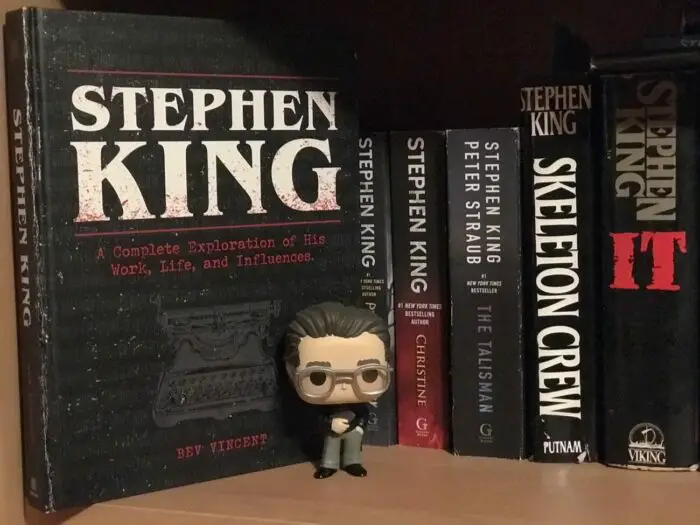September 2022 is an exciting month for Stephen King fans. Mr. King turns seventy-five; his new novel Fairy Tale hits shelves; and the expert in all things King, Bev Vincent, is releasing his expansive study, The Stephen King Ultimate Companion: A Complete Exploration of His Life, Work, and Influences.
The quick take is: Vincent’s book holds strong appeal for King’s “Constant Reader” fans, folks entirely new to King, and everyone in between. The author selects and synchronizes the insights, anecdotes, and details in this study with a blend of love for the topic and perspective of rigorous research and analysis. What’s more, the images of King and various documents, from draft pages to correspondences with editors and others, complement what’s written with a lively depth that pops off the pages. Frankly, it’s a beautiful book, designed with character and creepiness that enhance the experience without becoming a gimmick or nuisance to reading. When I received my review copy, the very first thing I did was flip page to page, giddy for what photos and layouts were coming up next.

The Stephen King Ultimate Companion moves mostly in chronological sequence. That said, Vincent innovates upon this temporal approach by opening up the sections on discreet King books to connections with life events and/or themes and tropes, characters, and concerns that appear at other points of the timeline. For example, the section on ‘Salem’s Lot takes us on a fascinating journey into the production and publication of the novel itself, while also identifying thematic concerns such as belief in and disavowal of monsters in diverse historical eras that creep across multiple King tales.
In a related way, the particular approach to chronological presentation in this book conjures a double vision of King’s literary production and the outward-facing cultural impacts he’s made. The bibliographic list of stories and their publication dates reflects the genealogies of social access to King’s work. Meanwhile, Vincent’s production history complicates that orderly narrative with the loopy and recursive tangle of how King built each work on the list.
Along the way, Vincent dips at times into King’s family life in connection with the writings. In these sections, Vincent draws connections between lived experience and the plots, characters, and motifs that emerged in the fiction. What makes this approach inviting is how Vincent often underwrites his assertions with direct quotes from King or others. It’s an approach to biographical criticism that’s grounded in primary source evidence rather than Vincent’s personal and subjective speculations. This approach sets the book apart from a lot of fan-expert writings that tend to grandstand their writers’ personal theories. Vincent masterfully crafts these sections without any sense of his own ego involved.
The backstory of King’s daughter Naomi and his writing of The Eyes of the Dragon is compelling, and the expansion of the role Tabitha played in the production of Carrie beyond the fairly well-known anecdote of her plucking pages from a trash bin is vital. The only complaint about the biographical element is that the book leaves us wanting more of these behind-the-scenes vignettes, particularly as they highlight the collaborative and empathic foundations of King’s creations.
While each book-centered section is a concentrated deep dive, there are numerous “Interlude” sections that visually disrupt the flow in order to reframe King and/or his works. Among these are compact histories of Castle Rock and Derry, the core fictional towns of King’s fiction that are on par with William Faulkner’s Yoknapatawpha County, Mississippi and David Lynch and Mark Frost’s Twin Peaks, WA. Readers just getting started with King will find these histories helpful guides to context and an inspiration of where to go next in their reading. Constant Readers who’ve read most or all of King’s works set in Castle Rock and Derry will find affinity in Vincent’s apt selection of details regarding the towns’ foundings, events, and cultures.

Other “Interlude” sections unfold an intriguing dialogue between King and his editor, Bill Thompson, on the sale of Carrie, King’s memory of an early screening of Carrie where intersections of race and gender shaped his hopes of how the film would do at the box office, and the antagonistic struggle King and his work encountered with the literary professor and cultural arbiter, Harold Bloom.
This condensed presentation on Bloom’s critiques of King is one part of The Companion that left me wanting a more sustained engagement. Vincent poses several questions about Bloom’s public disparaging remarks alongside quotes from King that suggest Bloom hadn’t actually read any of his fiction. It’s true that Bloom addressed King’s widespread popularity with concern that it signaled a waning of American literature and culture more broadly, yet it’s also true that he edited not one, but two collections of academic essays on King’s work. It would be fascinating to read what perspectives Vincent would present if, rather than simply rejecting Bloom’s remarks, he explored them more piercingly to identify what ideological buttons King pushes, past and present, that make the protectors of certain hierarchies tremble and rage. What’s more, this same conversation in the book can indirectly point out just how magnanimous Stephen King has been in supporting fellow creators and causes for the common good.
On a final note, Vincent’s book includes an expert synopsis of rare editions and collecting. This gesture connects the economics and arts of publication and production with the energies and communities of fandom. Even though I don’t personally collect books, I loved learning about the diverse publishers and artists who create beautiful volumes for folks who want to build King displays as well as the quirky errata that have popped up on Stephen King dust jackets and elevated the collectible value of these mistake editions.
As a combination of beautifully-produced object and research-grounded perspective, Bev Vincent’s The Ultimate Stephen King Companion belongs in the collections of curious fans of King and horror fiction as well as analytical readers inside literary academia and out.


